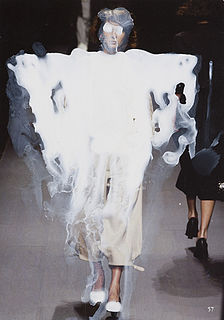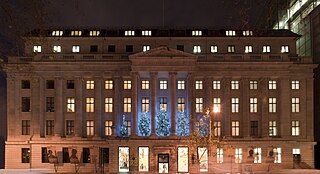Related Research Articles

The disability rights movement is a global social movement that seeks to secure equal opportunities and equal rights for all people with disabilities.
Edward Verne Roberts was an American activist. He was the first student who relied on a wheelchair to attend the University of California, Berkeley. He was a pioneering leader of the disability rights movement.

Judith Ellen "Judy" Heumann is an American disability rights activist. She is recognized internationally as a leader in the disability community. Heumann is a lifelong civil rights advocate for people with disabilities. Her work with governments and non governmental organizations (NGOs), non-profits, and various other disability interest groups, has produced significant contributions since the 1970s to the development of human rights legislation and policies benefiting children and adults with disabilities. Through her work in the World Bank and the State Department, Heumann led the mainstreaming of disability rights into international development. Her contributions extended the international reach of the independent living movement.

Feminist art is a category of art associated with the late 1960s and 1970s feminist movement. Feminist art highlights the societal and political differences women experience within their lives. The hopeful gain from this form of art is to bring a positive and understanding change to the world, in hope to lead to equality or liberation. Media used range from traditional art forms such as painting to more unorthodox methods such as performance art, conceptual art, body art, craftivism, video, film, and fiber art. Feminist art has served as an innovative driving force towards expanding the definition of art through the incorporation of new media and a new perspective.

Wellcome Collection is a museum and library based at 183 Euston Road, London, displaying a mixture of medical artefacts and original artworks exploring "ideas about the connections between medicine, life and art". Founded in 2007, the Wellcome Collection attracts over 550,000 visitors per year and is advertised as "the free destination for the incurably curious". The venue offers contemporary and historic exhibitions and collections, the Wellcome Library, a café, a bookshop and conference facilities. In addition to its physical facilities, Wellcome Collection maintains a website of original articles and archived images related to health.
"Piss on Pity" is a slogan coined by musician Johnny Crescendo in 1990 to protest stereotypes of disabled people. It was first deployed during the 1990 and 1992 Block Telethon protests outside of ITV Studios in the United Kingdom. The slogan was printed on t-shirts and thousands were sold.

The American Association of People with Disabilities (AAPD) is a 501(c)(3) non-profit organization which advocates for the legal rights of people with disabilities. One of the primary purposes of the AAPD is to further the implementation of the provisions of the Americans with Disabilities Act. As a national cross-disability rights organization, AAPD advocates for full civil rights for the 50+ million Americans with disabilities by promoting equal opportunity, economic power, independent living, and political participation.
Harilyn Rousso is an American disabled rights activist, psychotherapist, artist, and feminist. In 2003 she was designated a Women's History Month Honoree by the National Women's History Project.
Disability art or disability arts is any art, theatre, fine arts, film, writing, music or club that takes disability as its theme or whose context relates to disability.
Shape Arts or Shape is a London-based arts charity, funded by Arts Council England, that provides opportunities for disabled individuals wanting to work in the arts and cultural sector. It trains participants and runs arts and development programmes across all of the creative arts: visual arts, music, dance, writing and acting.

DaDaFest is a disability arts organisation based in Liverpool, UK. It delivers an international, biennial festival and organises other events to promote disability and deaf arts from a variety of cultural perspectives. Alongside the festival and events, DaDaFest organises opportunities for disabled and deaf people to gain access to the arts. This includes training and a youth focused programme.
Krip-Hop is a movement demonstrating alternate arrangements by which hip hop artists with disabilities can communicate through social media, including educators, journalists and conferences. The movement uses hip hop music as a means of expression for the disabled, providing them an opportunity to share their experiences.
Anthony James Heaton OBE is a British sculptor, disability rights activist and arts administrator, who was appointed an OBE in 2013 for services to the arts and the disability arts movement. He was CEO of the arts charity Shape until March 2017. In 2012, he won the competition to produce an installation celebrating Channel 4's involvement in the London 2012 Paralympic Games. This produced his 'Monument for the Unintended Performer'.
The Disabled People's Direct Action Network (DAN) is a disability rights activist organization in England and Wales that campaigned for civil rights with high-profile street demonstrations involving civil disobedience, rallies and protests.
Ian Stanton (1950-1998) was a singer songwriter and disability rights activist known for his ironic lyrics about the civil rights struggle of disabled people. He performed his music across the UK and internationally; as well as being an actor on stage and national TV. He worked at the Greater Manchester Coalition of Disabled People as the editor of the Coalition magazine.
The Greater Manchester Coalition of Disabled People (GMCDP) was established in 1985, a membership organisation in the UK that is controlled by disabled people. GMCDP is regarded as being influential in the social, cultural, economic, and legal policy debates on a national stage that have impacted on disabled people, grounded in the Social Model of Disability. The GMCDP magazine Coalition was referred to in these debates, its articles being cited in academic textbooks as well as within the community. The history of GMCDP has been a microcosm of the history of the radical disabled people's movement in the UK since the 1980s, with GMCDP members often involved centrally and nationally.

Paul Darke CF is a British academic, artist, filmmaker, podcaster and disability rights activist. Darke is an expert on disability in film and politics.
Jennifer White-Johnson is an artist and activist living in Baltimore. As a disabled Afro-Latina artist with ADHD and Graves' Disease she uses graphic design and photography as a means to discuss the intersection of disability rights and anti-racism, and to give visibility to misrepresented voices. After getting her MFA in Graphic Design from Maryland Institute College of Art, she has had the opportunity to partner with many brands, and taught as professor of Visual Communication Design at Bowie State University. Some of her notable works include the Black Disabled Lives Matter symbol, and a Black Autistic Joy advocacy zine called Knox Roxs.
Barbara Lisicki is a British disability rights activist, comedian, and equality trainer. She is a founder of the Disabled People's Direct Action Network (DAN), an organization that engaged in nonviolent civil disobedience to raise awareness and to advocate for the rights of disabled people. She is a featured subject of the 2022 BBC docudrama Then Barbara Met Alan, and appeared in The Disabled Century on BBC2 in 1999.
References
- ↑ "Visitors to new wing 'will feel the power of the disability protest movement'". Disability News Service. 9 May 2019. Retrieved 17 February 2021.
- ↑ "A striking new archive is capturing the radical spirit of the Disability Arts Movement". The Independent. 29 June 2018. Retrieved 17 February 2021.
- ↑ Welsh, Sarah (27 July 2018). "The archive of 3,500 objects giving disabled designers and artists a voice". Design Week. Retrieved 17 February 2021.
- ↑ "The 'golden age' of disability arts". BBC News. 15 December 2015. Retrieved 17 February 2021.
- ↑ Tony, Heaton. "'There is a strong feeling among disabled people that we have been losing ground'". Museums Association. Retrieved 17 February 2021.
- ↑ "Project set to bring 50 years of disabled people's movement to life". Disability News Service. 21 May 2020. Retrieved 17 February 2021.
- ↑ "Artists and Activists". National Disability Art Collection and Archive. Retrieved 31 January 2022.